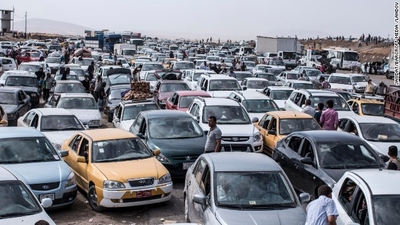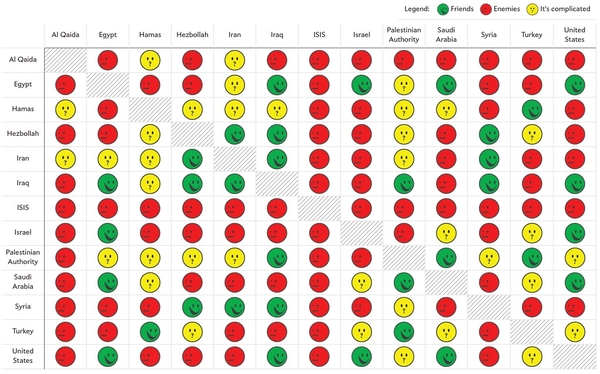The jihadis' takeover of Mosul on June 9 won them control of Iraq's second-largest city, a major haul of weapons, US$429 million in gold, an open path to conquer Tikrit, Samarra, and perhaps the capital city of Baghdad. The Iraqi Kurds have seized Kirkuk. This is the most important event in the Middle East since the Arab upheavals began in 2010. Here's why:
Regional threat: The Islamic State in Iraq and Syria (ISIS), a designated terror group, is in a position to overthrow the governments of Iraq and Syria and perhaps beyond, starting with Jordan. Straddling the Iraq-Syrian border, it may both erase the nearly century-old border between these two colonial creations and end their existence as unitary states, thereby overturning the Middle Eastern political order as it emerged from World War I. Rightly does the U.S. government call ISIS "a threat to the entire region."
 Map with towns under the control of the Islamic State in Iraq and Syria. |
Unexpected strength: These developments establish that the most extreme and violent form of Islamism, as represented by Al-Qaeda and like groups, can go beyond terrorism to form guerrilla militias that conquer territory and challenge governments. In this, ISIS joins the Taliban in Afghanistan, Al-Shabaab in Somalia, Al-Nusra Front in Syria, Ansar Dine in Mali, and Boko Haram in Nigeria.
 A suicide bomber along with Al-Qaeda's flag ("There is no deity but God, Muhammad is the prophet of God") and "The Islamic State in Iraq and Syria" both below and in the upper right. |
Muslims hate Islamism: Thanks to the ferocious reputation ISIS has established in its capital city of Raqqa, Syria, and elsewhere, an estimated quarter of Mosul's population of almost two million has fled. The current round of ISIS brutality will newly render Islamism obnoxious to millions more Muslims.
 Mosul residents fleeing ISIS turned roads into parking lots. |
Ultimate frustration: Therefore, however much damage the Al-Qaeda-type organizations can do to property and lives, they ultimately cannot emerge victorious (meaning, a caliph applying Islamic law in its entirety and severity) because their undiluted extremism both alienates Muslims and scares non-Muslims. In the end, tactically cautious forms of Islamism (e.g., that of Fethullah Gülen in Turkey) have the greatest potential because they appeal to a broader swath of Muslims and less worry non-Muslims.
Sunnis vs. Shi'ites: ISIS military advances directly threaten Iraq's Shi'ite dominated, pro-Iran regime. Tehran cannot allow it to go under; accordingly, Iranian forces have already helped retake Tikrit and greater Iranian involvement has been promised. This points to a replica of the ethnic lines in Syria's civil war, with Turkish-backed Sunni jihadis rebelling against an Iranian-backed Shi'ite-oriented central government. As in Syria, this confrontation leads to a humanitarian disaster even as it turns Islamists against each other, thereby serving Western interests.
The Mosul Dam looms: In the 1980s, Saudis and other Arabs funded a poorly constructed, quickie dam on the Tigris River about 35 miles northwest of Mosul. Substandard construction means it leaks and needs constant grouting and other expensive measures to avoid cataclysmic collapse. Will ISIS hotheads continue these repair works? Or might they skimp on them, thereby threatening not just Mosul but much of inhabited Iraq with catastrophic flooding?
American failure: More clearly than ever, the success of ISIS forces exposes the over-ambitious goals of the U.S.-led invasion of Iraq (and, likewise, of Afghanistan), which cost the West thousands of lives and over a trillion dollars. The fancy façade of $53 billion in American-sponsored institutions, from failed hospitals to the Iraqi National Symphony, have been exposed as the fiasco they are. ISIS soldiers standing triumphant atop U.S.-supplied military equipment brings home the folly of once-high American hopes for "a stable, democratic, and prosperous Iraq."
 Government of Iraq security shed their uniforms to escape ISIS. |
Republicans: Republicans unfairly blame the ISIS victories on Barack Obama: no, George W. Bush made the commitment to remake Iraq and he signed the "Status of Forces Agreement" in 2008 that terminated the American military presence in Iraq at the close of 2011. For the Republican Party to progress in foreign policy, it must acknowledge these errors and learn from them, not avoid them by heaping blame on Obama.
Democrats: The execution of Osama bin Laden three years ago was an important symbolic step of vengeance. But it made almost no difference operationally and it's time for Obama to stop crowing about Al-Qaeda being defeated. In fact, Al-Qaeda and its partners are more dangerous than ever, having moved on from terrorism to conquering territory. The well being of Americans and others depend on this reality being recognized and acted upon.
Western policy: This is basically a Middle Eastern problem and outside powers should aim to protect their own interests, not solve the Middle East's crises. Tehran, not we, should fight ISIS.
Mr. Pipes (DanielPipes.org) is president of the Middle East Forum. © 2014 by Daniel Pipes. All rights reserved.
June 12, 2014 addenda: (1) The effective elimination of the Syria-Iraq border over the past days raises the possibility of two quite contradictory scenarios, both of which verged on the outlandish until now:
- The creation of "Suraqiya," a combination of Syria and Iraq, a form of the Fertile Crescent. Anton Sa'ada, the founder of the Syrian Social Nationalist Party, devised this term in the late 1940s before his death. It has arisen from time to time, for example, in 2009.
- The division of Iraq into two or three mini-states (Kurdistan, a southern Shi'i state, and perhaps a Sunni Triangle).
The larger point is that the inherent instability of the Middle East's World War I-era Western-imposed boundaries is now coming fully evident. Changes in the borders in the Arab heartland could possibly cascade beyond it.
(2) In addition to the Mosul Dam, ISIS could make other trouble with the river waters it controls. See "A Jihadist Group That's Too Radical For Al Qaeda Is Threatening Iraq's Water."
June 13, 2014 update: For a graphic explanation of why ISIS cannot prevail, see the table below, where Column 2 has nothing but 1s and 2s in it. Table courtesy of Blaise Misztal, "The Rise of ISIS Reveals the Middle East's Shifting Alliances," Bipartisan Policy Center.
 The enemy of my enemy is not always my friend. |
June 15, 2014 update: Here is the text of a media statement I gave out today:
Tehran has been busy making Iraq a virtual satellite state (I prefer the ancient Persian term satrapy) since the U.S.-led invasion in 2003, and especially since American forces left at the end of 2011. The process is quite far along. One consequence of the takeover is discrimination against and persecution of Sunnis, prompting their frequent revolts, especially in 2006 and now.
As in the Syrian theater, I advocate helping neither side, Sunni rebel or Shi'i oriented regime in Iraq, unless either side is in danger of collapse, in which case we help it live to fight another day. Better that the Turkish-backed Sunni jihadis fight the Iranian-backed central government in both places than either side turn its guns against us. We want the jihadis at war with each other, not us. Turkey and Iran, not we, must deal with this mess of their own creation. It's also fine that this situation creates problems for the Erdoğan and Khamene'i regimes, reducing their abilities to make mischief elsewhere.
May the conflict go on until the colonial creations of Syria and Iraq split into their component parts - especially Kurdistan, whose emergence is a very positive development. Our ultimate goal should be that the miserably failed states of Syria and Iraq devolve into Kurdistan and other small, more homogenous, less repressive, and less aggressive polities.
Our main focus should be on alleviating the humanitarian crises by means of everything from tents to urging the states supplying weapons to desist. pressure on the outside powers fueling this now one-grand civil war across the Fertile Crescent (or what some ideologues call Suraqiya).
This is old-fashioned strategic analysis, now wildly out of favor. But its verities remain as valid today as always. And someone needs to say it.
June 19, 2014 update: The deputy editor of the Saudi daily Al-Hayat, Jamil Al-Dhiyabi, argues in an article, "Al-Ahwaz – A Member of the [Gulf] Cooperation Council," that the GCC should support the secession of Arabic-speakers in Iran's Ahwaz province. Another challenge to existing Middle Eastern borders? And if the mini-empire of Iran were to break into its constituent parts, this would keep the Middle East busy for many years.
June 21, 2014 update: Iran's Foreign Minister Mohammad Javad Zarif has stated that ISIS, "an extremist Takfiri group, is a threat to the whole region and the entire world."
June 30, 2014 update: Even Time magazine understands that something big is underway.
 The cover of Time magazine, June 30, 2014. |
July 17, 2014 update: Slate's Joshua Keating and Chris Kirk have published "The Middle East Friendship Chart" that even more graphically than the Misztal table above shows the isolation of ISIS.
 No one likes ISIS. |
